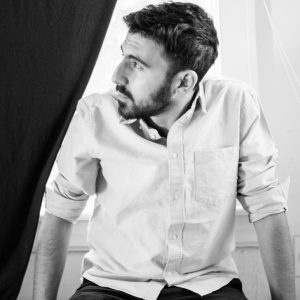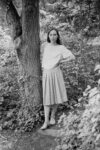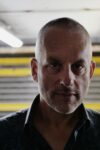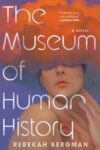 Omar Robert Hamilton is an award-winning filmmaker and writer. He has written for The Guardian, the London Review of Books, Mada Masr, and Guernica. He is a co-founder of the Palestine Festival of Literature and the Mosireen media collective in Cairo. The City Always Wins is his debut novel.
Omar Robert Hamilton is an award-winning filmmaker and writer. He has written for The Guardian, the London Review of Books, Mada Masr, and Guernica. He is a co-founder of the Palestine Festival of Literature and the Mosireen media collective in Cairo. The City Always Wins is his debut novel.
Hamilton was active in the Egyptian revolution of 2011 and its aftermath. The City Always Wins was born of this involvement. The writing is both urgent and artfully controlled — a singular feat. It is, literally, a must-read for anyone interested in how literature can engage with politics without losing its function as an aesthetic creation. Which is to say this should be read by everyone.
Hamilton is based in Cairo and New York. We corresponded by email.
Cara Benson: Let me start off by saying The City Always Wins is a book that is grappling with all the things I want a book to investigate — art, politics, personal relationships, global capitalism, authoritarianism, the possibilities of revolution, among many other topics. It is a passionate, lyric, and affecting novel. With it you have surely broadened an understanding of the Egyptian situation, the revolution of 2011 and equally importantly what has come of it. Of course we don’t necessarily start off to write books that educate, but I do think and hope yours will. Did you have specific reasons for writing it? Or, more viscerally speaking, what moved you to make this work?
I started writing in the summer of 2014, a year after the military coup. I didn’t sit down and decide to write a book, but I knew that I had to produce some kind of record of the years of the revolution. At that point Sisi had cemented his grip on power, the prisons were full of activists and the Rabaa massacre had shocked a disobedient country into submission. So it was a moment of terrible weakness. And it had become clear that whatever chapter of history had begun in 2011 was ending, or had ended.
You don’t write the history of something that is still in process — but if the revolution was over I knew that I had to do something for the record of it. That I had a significant amount of information and experience and feeling, and so with that came a responsibility.
When I sat down with a pen it became clear very quickly that it would be a novel. I was confused at the time, I hadn’t been able to work for several months and what I wrote varied wildly in form and content and quality. But the nice thing about the novel is that — as a form — it can accept nearly anything. So I didn’t have to lay out an ordered plan and then set about achieving it — I could just write. And pretty soon I felt I had the hold of some kind of thread that I would keep pulling at.
And the good thing about historical responsibility is that you don’t have to interrogate it too much — you can just run with it.
There is so much to say about your use of form, but I’ll get back to that. First, can you speak more to that last statement regarding running with historical responsibility rather than interrogating it? What do you mean by that?
Well the question is always what’s the point? What’s the point in doing or writing or creating X? Is writing the sci-fi screenplay kicking around my head going to improve the world in any way or bring us closer to any kind of new and fairer society? What does social justice look like and how can it be achieved, what’s working out there, what’s not? What’s the route to the next revolution? Will we be ready next time? Will my sci-fi screenplay help us take power? Or destroy power altogether? Should it? Is that what sci-fi movies are supposed to do or is that how you find yourself making Cold War propaganda? Where’s the political line that art should tread? And is that the point — that line? Isn’t there some less pragmatic, more aesthetic, experiential height or inexpressible depth to be reaching for?
And so on.
Obviously I don’t have the answers and never will. But when faced with an empty page that’s the maze my brain invariably hurries in to.
But with The City Always Wins I found I didn’t have to have that debate with myself. Because this feeling of historical responsibility was the prime mover I could just get on with writing, and have those questions run themselves through the prose. So the interrogation became part of the book — rather than a barrier to writing.
There is an easy cultural consensus around the value of historical preservation, saving things for ‘future generations’ etc., which gave me a kind of pass. I could tell myself I was writing for the historical record and since everyone’s agreed on history’s importance I didn’t need to hobble myself with paralyzing questions about the efficacy of art in the nuclear-digital-climate-catastrophic age.
Your effort is particularly important in light of the trope that history is typically recorded by the ‘winners.’ Your ability to put this book out is certainly due in part to changing dynamics regarding the means of cultural production, but also I wonder if there isn’t an emotional component. Who feels they have permission to record history. I don’t want to posit too easy a gender analysis, but do you think it plays any role here?
Yes it always plays a role. For me, I feel myself writing and working in concert with the people around me. My mother, Ahdaf Soueif’s book, Cairo: Memoir of a City Transformed, is in many ways the immediate, documentary antecedent to my book. And my wife, Yasmin El-Rifae’s forthcoming book, goes into incredible detail on something that is central to The City Always Wins — the sexual violence used against women in the revolution — but that my experience and my gender set clear limits around the possibility of my telling is certainly true.
Within the revolution, women were the leaders all around me, in my family and among my colleagues. My own role was largely in the background — holding the camera, the microphone, the pen. So when it came time to write this history of it I tried to reflect that dynamic in the book’s action and characters.
But, yes, gender continues to play a role. From the industry side the book is marketed with violence and tear gas on the front cover, the content and tone of the text was never interfered with in ways that women’s writing — particularly violence — can be, I’m not smiling in my author photo, my appearance or body is not a factor in my commodification. And gender will play out in how it is received. As will my bi-culturality, my hybrid name, my language being English.
For publishers, decisions obviously take in a balance of a book’s literary quality and its viability as a marketable commodity. Right now I’m in Level One of the machine of cultural production — and we’ll wait to see how it’s received and if it sells enough copies to get up to Level Two. Meanwhile, one has to keep aware of one’s role within the machine and to try and — if its dynamics are changing — keep pushing it to change further.
You do think those dynamics are changing? Could you say more?
I’m referencing the proliferation of technology that has afforded many more the opportunity to produce and distribute narrative. So, yes, I do think in some ways the dynamics are changing. The reach of the revolutionary media collective in The City Always Wins and its real-life counterpart is case in point, no? Which isn’t to say that State power (the ‘City’) hasn’t and doesn’t and won’t continue to assert itself over these efforts. More pushing is clearly needed. It’s a dance of complicity and resistance, perhaps.
Your attention to the women of the revolution in the book — the leaders, the mothers of the martyred, the victims of sexual assault — is incredibly skillful and nuanced. Of the two lead actors in the novel, Mariam and Khalil, she opens the book. She’s unwavering in her conviction. She pushes and criticizes Khalil on his apparent support for the elections that unwittingly ushered in The Brotherhood. Not only my experience of her, but of how you plunge us into this concert, to borrow your word, of people uses the art of the novel so expertly to make me feel both the chaos and the community of the time.
Which brings me back to form. The City Always Wins is brilliant in its design, its structure, and in particular its treatment of chronology. The spiraling timeline seems to give you the ability to allow questions of ideology, of pragmatism, of what to do in the chaotic aftermath of the revolutionary impetus, to arise in the story the way they often do in real time in movement politics. I definitely feel like a straightforward enacting of chronological plot would not have the impact that this work does. The three metaphoric parts the book is divided into, in this order: Tomorrow, Today, Yesterday. They give this the feel of a fable. Of something that is bigger than the specific datelines within each section. Can you talk about your process creating the timeline of the book?
I learned an important lesson on the last fiction film I made, Though I Know the River is Dry, where I fragmented the narrative to such an extent that it was very hard for the viewer to have an emotional connection with the plot. I over-theorized and over-stylized and while it made for a nice puzzle I don’t think it was emotionally satisfying as a narrative experience.
The first few drafts of The City Always Wins were very cut and chopped, moving jaggedly through time in a very confusing and disorienting way. I showed an early draft to a literary agent, and when he passed on it I realized I was making the same mistakes I’d made with River again. When the chronology or plot is too confusing there is no foundation from which the audience can build an emotional connection to the story.
And you can’t have a story about a revolution that doesn’t involve emotions. A key part of a revolution’s power is its emotional pull.
So I set about re-writing and worked the chronological shifts into the characters’ memories. I tried to thread a line through the action that the reader can always hold on to. Because it can be confusing, and sometimes that book wants you to be confused (because the political moment was confusing) — so you need that emotional thread to hold on to even if you’re not sure exactly where — or when — you are.
And, to press on with this metaphor, that thread leads through the main ideas that the narrative is organized around: the overarching movements (collective-individual, exterior-interior, future-past, strength-fragility, pride-reflection) that run the length of the book. Then within each of the three sections — Tomorrow, Today, Yesterday — there are separate narrative principles at work that are supposed to create specific effects within each.
In the second part, you use journalistic datelines and headlines to name each section, but the story that accompanies the headline isn’t the story of the lede. I love this effect. We are situated in the larger unfolding of the national situation and then experience the particulars of the characters we’re following as part of that story. This is what is happening, for example, with Khalil or Mariam while Fuel Rationing or Police Abuse on the Rise is occurring. We read their actions under the influence of these broader circumstances, by which I mean our reading is also under the influence.
How do you tell the story of something that involves millions of people? How to get a bird’s eye view and an on the ground view? Using these headlines is one way. The scene when Mariam and Khalil are up in a building watching for the patterns of bodies in the crowd that indicates an assault is happening is another. This is partly the collective-individual theme of which you spoke.
I’m interested in the pride-reflection movement. Why was that important to you? How did you achieve that in the book? What place does it hold for you in the revolution or in politics more generally?
Pride-reflection, or pride-fall is obviously a classical progression that happens throughout literature. And it feels like a progression that most revolutions go through too. You need pride, arrogance, a belief you can improve the entire world to start off on the road of a revolution. And it is inevitable that you will somehow fail — Utopia has to be unattainable because it’s the searching for it that really counts.
Even so, it’s a humbling moment when you realize that you’ve gone through the same emotional arc that people in countless revolutionary moments have lived before you. An article I wrote right after the Rabaa massacre in August 2013 was probably the most raw thing I’ve ever written:
We thought we could change the world. We know now that that feeling was not unique to us, that every revolutionary moment courses with the pulse of a manifest destiny. How different things feel today. I will not bury our convictions, but that feeling — youthful optimism? naiveté? idealism? foolishness? — is now truly and irrevocably dead.
And we live on in the shadow of that moment to this day. The book itself exists because of the pride-fall-reflection movement. Thinking about it, the book actually is the reflection.
I think a lot about emotion and politics. “Channel the outrage into action.” This is a common saying running through the discourse in the US, of late in particular. Revolution might require emotion, but political action doesn’t, right? It is the day in and day out commitment that one follows through on because that is what is to be done that day. There is only so long that affect can fuel the political work. Inevitably one will be disappointed, spent, frustrated if one is seeking catharsis, no?
I say this not from having answers, but from a place of asking myself these questions. And as one who only experienced the very incipient whisper of what many of us had hoped would evolve into revolution here (Occupy). I say this as a writer who also writes her way through her politics via poiesis. By poiesis I do not mean solely poem, rather the made creative thing generally.
So, what has The City Always Wins shown you? How has this reflecting informed your living and your politics now? In other words, how has the writing of the book changed you, if it has?
Yes, a revolution needs emotion for sure but, as you say, it generally comes about as a result of years of a baseline of cool, sustained work. For me not only was the emotional stake in the revolution wiped out by Sisi and the crackdown that came with him, but so was that regular, day in day out work. I was not a writer before Sisi, I was a filmmaker working with a collective of people, putting out uncredited work as Mosireen. And then that work ended.
I spent a long time with only the most negative of emotions. Then when I began to write and writing, in a way, filled in for my political commitment, my day in day out work.
But there’s a discomfort in that too. Not for fear of becoming a propagandist, but because politics is, at its heart, about groups of people acting in concert to try and shape the world. And writing — especially writing from memory — can be extremely isolated, individualized work. So you spend years not building a structure of an organization or the infrastructure of an environment or the academic framework for a school — but an architecture for a story.
So I don’t know if it changed me. I’m a different person now than I was when I started writing — but three years will do that to anyone.
It’s almost three years to the day that I started writing actually. I went to New York for three weeks in the summer of 2014 and it was that moment away from Cairo and the relentless grind of daily repression (call it the day to day commitment of the state to its political project) that got me working again. I started writing and my whole body and mind just poured into it. At a moment when absolutely everything seemed outside of my control, to sit alone and quietly write became the key for me to start working again. Much of the later parts of the book, the Part III passages, were written that summer. Passages I couldn’t write now if I tried.
So, yes, my approach to writing or politics or how I think about living have all changed — but I don’t think it’s the writing that changed me. Writing the novel was the 3 year tail of the whole revolution experience. Now that’s done the chapter that began for me in 2011 can close. I can start on something new, build something new with other people again.
Cara Benson‘s stories and poems have been published in The New York Times, Boston Review, Best American Poetry, The Brooklyn Rail, Fence, Hobart, and elsewhere. She’s at work on her second book, an autofiction set in the time of late capitalism.
This post may contain affiliate links.







